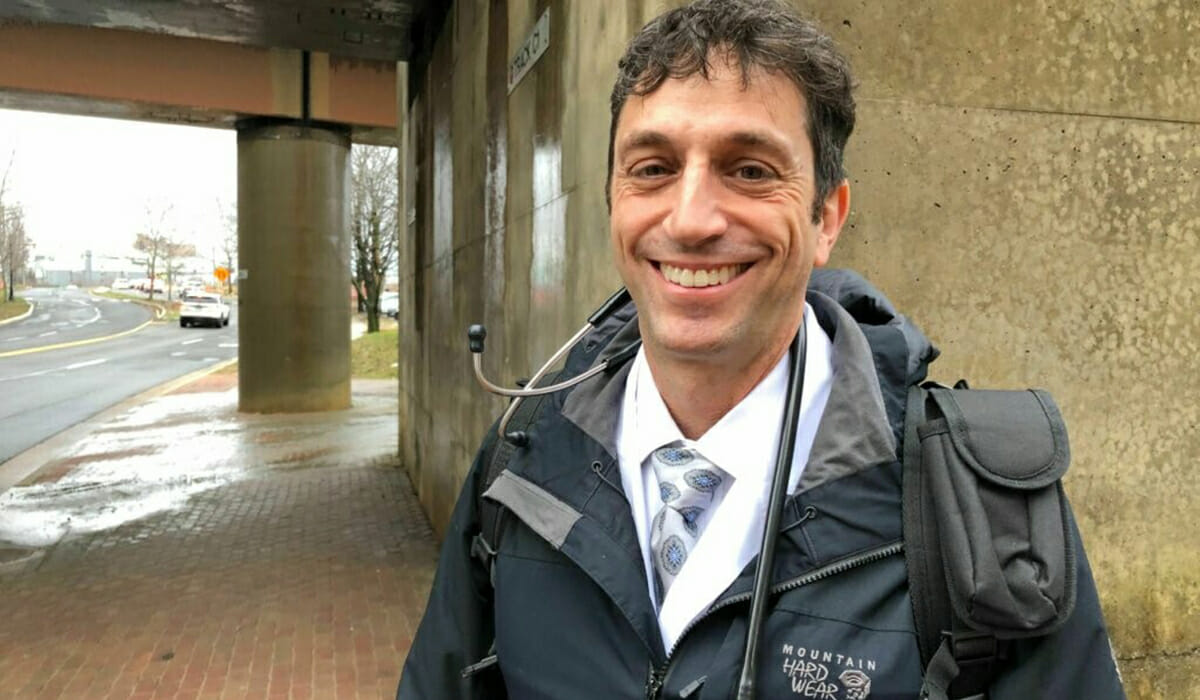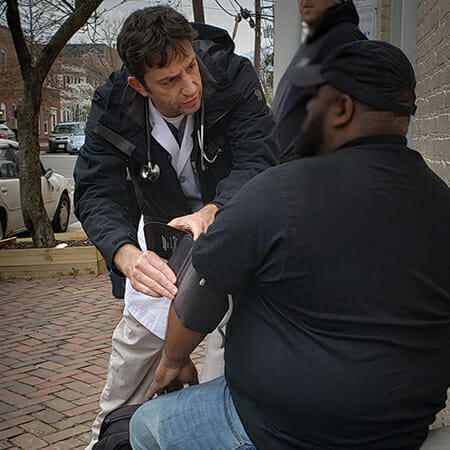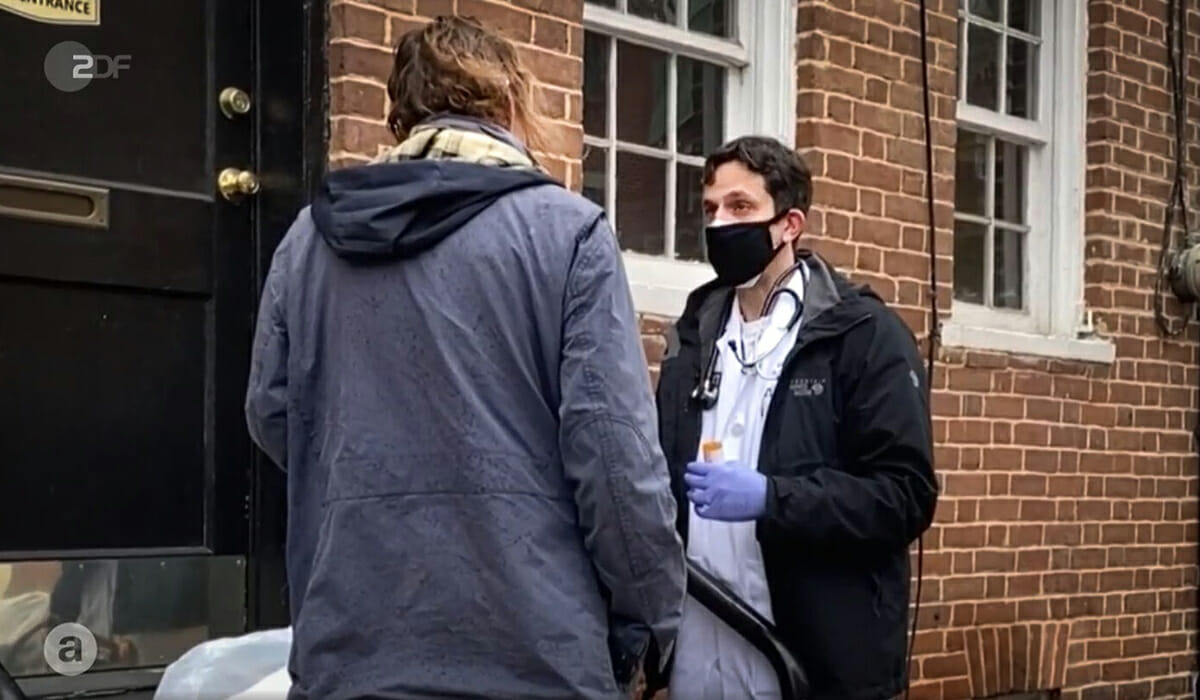Doctor Forms Nonprofit to Provide Free Healthcare to Homeless

Meet Daily Point of Light Award honoree Dr. William Mazzella. Read his story and nominate an outstanding volunteer or family as a Daily Point of Light.
Dr. William Mazzella has been helping people for almost his entire life, with his motivation to do so first starting when he was in the sixth grade. While visiting the nursing home where his mother volunteered, he met a stroke patient who had lost the ability to walk or speak. Dr. Mazzella remembered the man crying and shaking and over his frustration at not being able to communicate. After leaving the visit, Dr. Mazzella purchased a book on basic programming language. He used it to teach himself how to write a program that would allow the patient to hit a computer space bar and choose what they wanted to communicate from a selection of phrases. From that moment on, his motivation to give back only grew.
Today, Dr. Mazzella is helping those in need with his nonprofit MedStreet, which provides free healthcare to the homeless population in his city of Alexandria, Va. and nearby Washington, D.C. He travels with his medical bag to wherever he knows he will find those most unable to afford healthcare, whether that be on the street or in parks, shelters, soup kitchens, or low-income housing programs. Aside from medical care, Dr. Mazzella brings the homeless coats, hats, heating pads, and sleeping bags sown by volunteers. Prior to COVID-19, volunteers including Dr. Mazzella’s wife and son would also join him to provide food. MedStreet is looking for volunteers and encourages anyone interested in helping to visit their website.
Describe what MedStreet is and what inspired you to start it.
I’m the founder of MedStreet. MedStreet is a nonprofit organization that provides free healthcare to the homeless. … I went to undergrad in Los Angeles at the University of Southern California, and there was certainly a significant homeless population there and that really got my attention and my heart. After undergrad, I went to medical school in Chapel Hill and in medical school we had a student health clinic where we would provide free healthcare to the low-income [and] no-income population. After med school, I went to residency, and in residency we would provide medical care at a homeless shelter. Since then, I’ve done medical missions to places like Haiti and Costa Rica to provide medical care to people who have no access to medical care. When my wife and I moved to Alexandria, I thought a lot about folks internationally who didn’t have a lot of medical care. Seeing the homeless in Alexandria and D.C., certain stuff brought to my attention that their plights are certainly similar. It seems like I could not only travel to other countries to provide help for people who need it, but I could do it right here in my own backyard.

My wife and I decided to start doing that. One day my wife, Brandy, made some sandwiches and packed bags with food and granola bars and things. I packed up a medical bag with medical supplies, and we went to a local park where we know the homeless hang out. We packed up our six-weeks-old son Joseph and we went to the park. It was a very funny afternoon, because the homeless population was there and I was there in my white coat and stethoscope and medical bag. We stood out. We were a very odd picture. They stared at us for awhile, and after a time we walked over to them and they were a little confused by us. Finally they started talking and I told them why I was there — I was a physician and here to provide medical care for anyone who might need it. At first they were like, “We’re good, Doc, thanks.” We were chatting and they started asking questions about Joseph. They were very enthralled with Joseph. He’s a very cute kid. Joseph broke the ice. We chatted for a few minutes and talked about Joseph and one of the people said “You know, Doc, actually I do need some help.” We went to the side to a little table with chairs and took care of a couple medical problems. Then that person went over to the cadre of other folks and next thing I know the next person came, and the next person came, and then MedStreet took off from there.
How often are you going out to treat people?
It’s hard to put it in an exact frequency. Obviously when I’m working in a hospital, it’s hard for me to get out. Sometimes it’s a few times a week and sometimes it’s almost every day. Sometimes it’s multiple times a day. I like going out in the morning because that’s when people need help the most. I’ll go out sometimes especially in the winter time at three or four in the morning. I’ll have not only my medical bag, but some coats and hats and heating pads so if anyone has hypothermia I can get them warm. A lot of churches offer breakfast. That’s a great time to catch folks when they are in need. A lot of them are cold, sleep deprived, and if they have medical conditions, a lot of the medical conditions are flaring or exacerbated in the morning, so I try to catch them when they are in the most need in order to do the most good. … I’m going out even more since COVID because there’s more need and there’s more fear. I’ve been giving talks to shelters and [having] conversations on the street about what COVID is, what are the real risks, what should one do to protect oneself. Answering many questions like that so people have useful strategies for dealing with it and not undo fear.
What has it been like for you to be able to share volunteering with your family?
It’s fantastic. I love it. I don’t know how to put it into words. It’s indescribable. Personally it means a lot to be able to reach out and help people, whether it’s writing a basic program language a la technology of the 1980s, or whether it’s using modern medicine that I’ve learned since to treat people. That’s very rewarding. I have to say the thing that really got us out the door was reading the Bible and going through Mark again. I ran into Mark 2:17, where of course Jesus is criticizing the Pharisees when the Pharisees are asking him why are you hanging out with these tax collectors and prostitutes, and if you were such an esteemed person, you wouldn’t hang out with these types of people. And Jesus responded, it isn’t the healthy who need a physician but the sick. Of course I understand that in the spiritual sense of how Christ meant it, but also it struck my heart in a very literal sense. For days and nights and weeks, I couldn’t get that out of my heart and I started losing sleep. I felt called to do this and make this happen, so that was the personal motivation that got me out. It means a lot both on a personal level and on a spiritual level to help God’s people and be able to do that with my family, with a wife who is wonderful and I’m very blessed to have and with a son who’s wonderful and I’m very blessed to have. We tried to have children for years and years and we had many infertility troubles. In fact, we went through multiple rounds of in vitro fertilization and failed and failed and failed. We were finally on our last embryo of who knows how many and we had given up honestly. We had our hearts broken so many times. We prayed about it and asked for it and it was overwhelming and then God blessed us with Joseph. So to be able to go with my wife and my son, who is a blessing, and do the Lord’s work — it’s hard to put into words what that means. It’s more than just a passion. It’s more than just a feeling. It’s a calling.
Is there any particular person you’ve helped or story of your volunteer work that sticks out to you?
It’s hard to choose one because I care about them all. There’s a woman who is the victim of domestic violence, a Muslim woman, and she stands out to me because she will ask for help for various things when I’m there. She has her son with her, and some of the help she asks for is not only on the medical side but with her personal life. At the end of our time together, we pray to God. We pray each in our own way together and it’s a beautiful picture of the world that stands out to me. I’ve been in a camp by the river where there was clearly a lot of violence and probably not a very good or safe situation. I walked up once and the hostilities seemed to be running high between some individuals, but it’s interesting — when I was there they put that down. They put it aside and they let me minister to them. It’s interesting to not only help on the medical side but to see people come together after that. During the visit, not only did we talk about health and treat some conditions they had, but we also ended up discussing hatred and animosity and how to lay those down.
There is a woman who I was treating multiple times for dental abscesses, but she couldn’t get access to a dentist. The city does have some clinics they provide, but they’re very overwhelmed and understaffed. There’s no way they can satisfy the need. I contacted a local dentist and asked her if she would see this person. I told her, whatever your fee is, don’t charge her, just send it to me and I’ll pay it, but please take care of her. The dentist responded to me that she would take care of her, but she wouldn’t charge anybody. She provided the dental care that the woman needed, but she actually needed a little surgery. Not only did she provide free dental care to her, but she called the oral surgeon and she referred the patient and said “I know this is going to be expensive but just bill me.” The oral surgeon says, “I’ll see this person but I’m not going to bill you or anyone else, I’m going to do this for free.” The patient eventually ended up going to the oral surgeon and getting care and he did it for free. That’s our community coming together. Then the story of when MedStreet got launched, speaking of the community, the response from the community was overwhelming. I think I received in a weeks time a thousand emails of people who wanted to volunteer and to help. The response from the community is just humbling and overwhelming.

Do you have any future partnerships, programs, events, or general plans for the future that you are excited about?
I do, and it comes from the response of the community. I think so many people want to help those in need and have a heart for those in need that I’m trying to set up MedStreet as a national platform. We’re creating a platform where physicians can lead healthcare teams across the country, sort of have their own MedStreet franchise where they are. There are a lot of obstacles to doing this, and most of them are regulatory, so satisfying the medical board’s regulations, the pharmacy board’s regulation, on and on and on. It’s very difficult and I think that prevents a lot of people from being able to do this. What I’m striving to do is to create a platform where physicians can create their own healthcare teams in their own communities where these obstacles and regulations are already satisfied, and then they can replicate it from where they are to help.
Why do you think it’s important for others to give back?
Mark 2:17 — those who need physicians are not the healthy but the sick. I think we’re called to care for others. Some people may do it for a feeling or other things, but I think it’s a calling. Not just for me, but for us all.
What do you want people to learn from your story?
I would hope that people would be inspired to help. I think real help comes person to person and through relationships. Whatever skills people have, I hope they are inspired to take those skills and help those in need.
Do you want to make a difference in your community like Dr. Mazzella? Find local volunteer opportunities.
